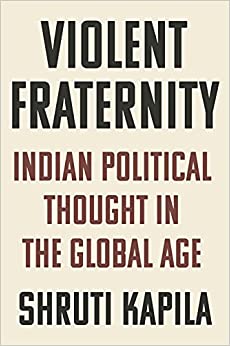The Book
Violent Fraternity: Indian political thought in the global age
The Author(s)
Shruti Kapila

Violent Fraternity is a history of Indian political thought from the beginning of the 20th century until independence in 1947. Kapila explains that the book’s ‘single motivation’ was ‘to take the power of political ideas seriously’ (p. 283). It takes a thorough approach to this complex and complicated task, explaining the tensions and relationships among the ideas of M.K Ghandi, Muhammed Iqbal, B.R. Ambedkar and Vinayak Sarvakar whose well-known thinking is drawn out alongside the less prominent but, Kapila argues, significant contributions of B.G. Tilak, Har Dayal and Sardar Patel. They are each studied in depth as Kapilla’s aim is to convert ‘these all-too-influential political actors into political thinkers’ (p. 2).
The book assumes a strong familiarity with Indian political and intellectual history. It is not an introductory text. Its scholarly depth is impressive, and it does, indeed, draw out the power of ideas. With this it illuminates the intellectual complexity of Indian nationalism during the first half of the twentieth century.
Fraternity, violence and sovereignty are the book’s recurring themes. This is to support the argument that contemporary Indian politics was not best defined in the contract of liberal political theory, but as ‘violent fraternity’ (p. 275). Kapila positions the book as providing a contrast with the extensive scholarship on the development of the Indian constitution which she describes as ‘celebratory’. The contrast is that the political ‘cannot be exhausted by the law’ (p. 275).
The political thinkers that Violent Fraternity discusses raise different arguments about violence as political resistance. However, Kapila argues that ‘by relocating violence in the individual’ their collective contribution was to embed it in ‘spaces of intimacy and fraternity rather than those of law, policing or legal citizenship’. This, in turn, ‘removed the political from the hands of the state’ (p. 275).
Removing the political from the hands of the state allowed republicanism to emerge. It ensured that sovereignty could reside with the people. The question of where and with whom, exactly, sovereignty should lie in a newly non-colonial state is one that dominates political relationships in many parts of the world. Such is the reach of Empire. It is commonly studied through the language, tactics and symbols of resistance movements. Kapila’s contribution is to the intellectual history of resistance. She is thus able to take her analysis to a rare, instructive and insightful depth.
The book argues that the anti-statist politics it identifies is not ‘simple’ or ‘facile’ but remains an important feature in contemporary political movements from ‘environmentalism to Maoism’ (p. 277). The book examines the complexities of this claim with respect to caste and religion as well as with respect to the rejection of colonial sovereignty.
Kapila shows how these early twentieth century political thinkers are the subjects of ‘renewed attachments’ and how: ‘The names of these iconic figurations function as invocations and labels: as a powerful shorthand that distills as it conveys the transformative power of political ideas’ (p. 282).
Violent Fraternity is a book that will interest both scholars of modern India and scholars of contemporary political thought. It is not an easy book to read. It presumes detailed background knowledge. However, its clarity and logic and its tracing of an important chapter in the decline of British imperialism makes it an instructive read.
About the Reviewer
Dominic O’Sullivan is Professor of Political Science at Charles Sturt University. He has published eight books and more than 60 peer reviewed journal articles, book chapters, conference papers and commissioned reports. His most recent book, Sharing the Sovereign: Indigenous Peoples, Recognition, Treaties and the State, was published by Palgrave Macmillan in 2021.

0